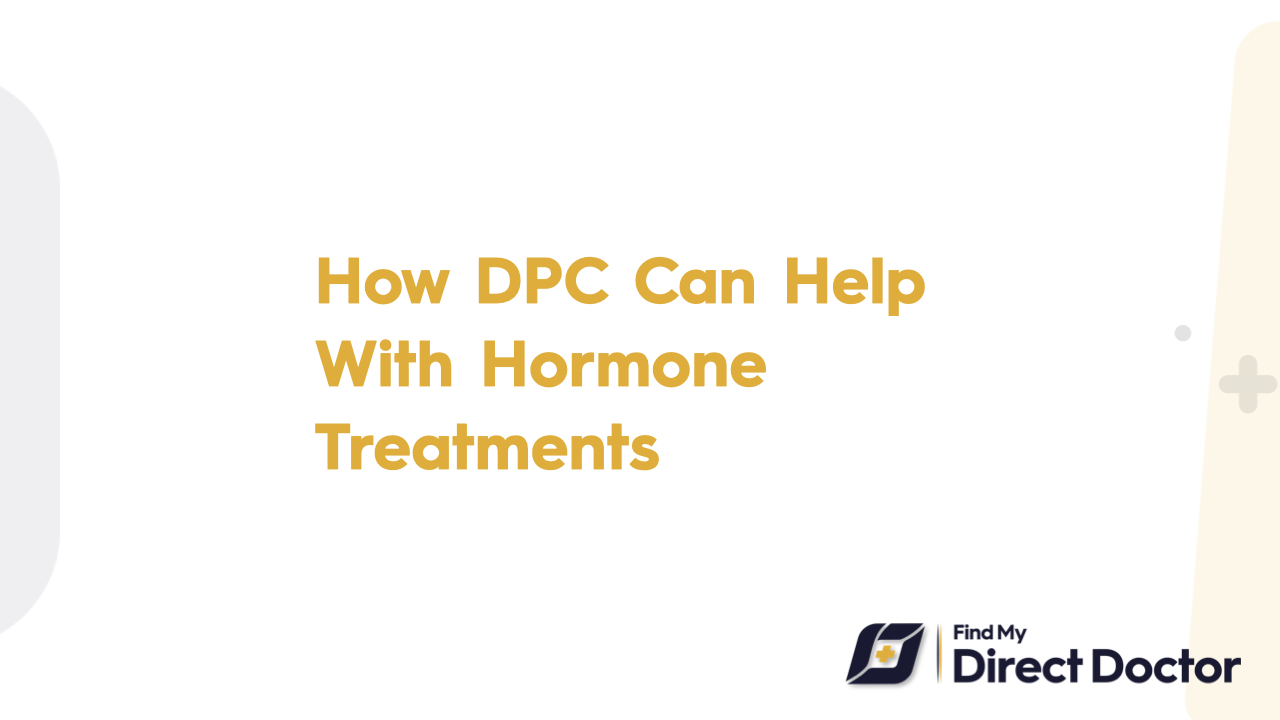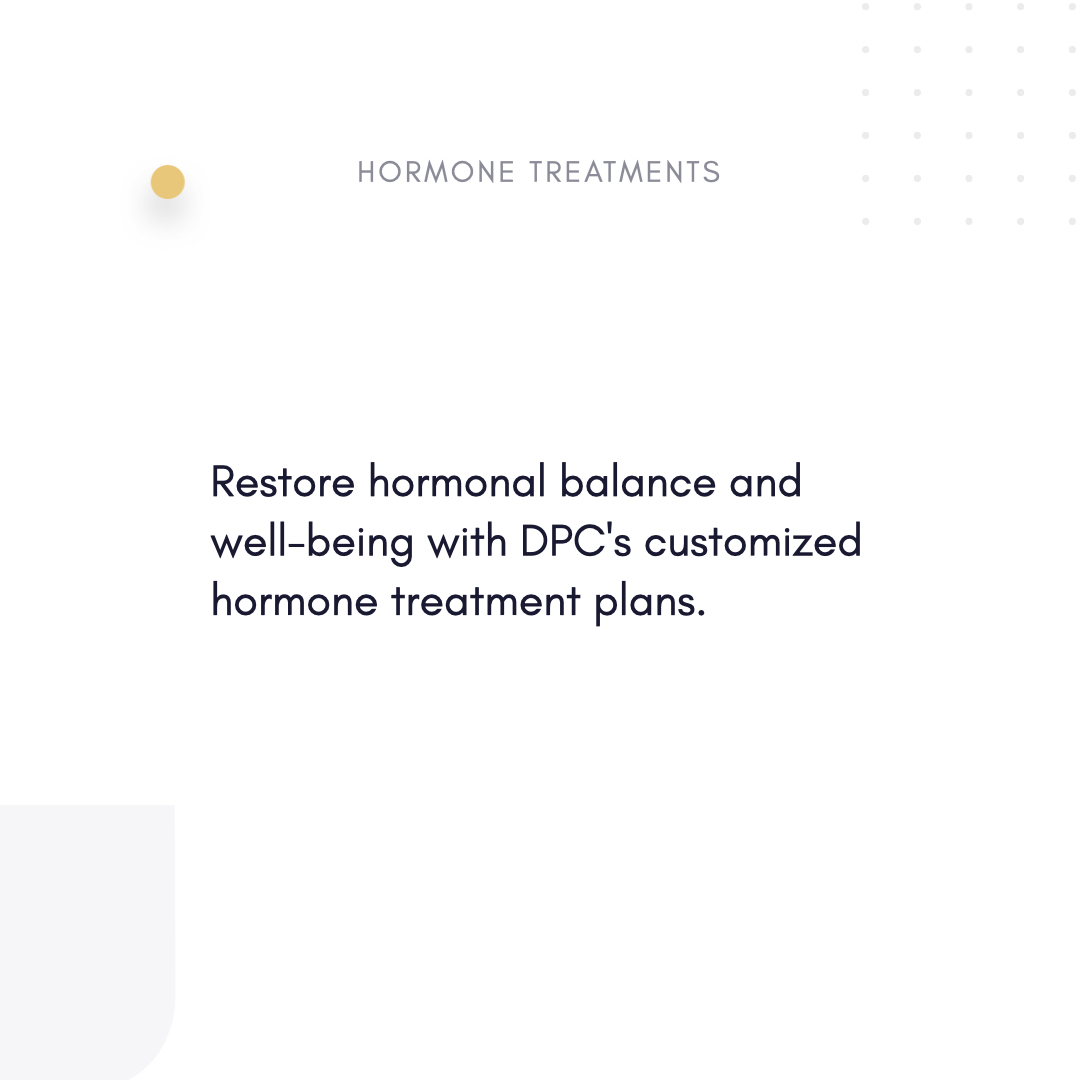Hormone Treatments and Direct Primary Care (DPC): Balancing Wellness, Personalized Care
If your life is hard because of hormonal imbalances, hormone replacement therapy (HRT) can help you get back to normal. This can happen when a woman goes through menopause, a man goes through andropause, or she has thyroid problems. DPC makes sure that this delicate process is done with care, safety, and ongoing help.

Getting to Know Hormone Treatments: Putting Things Back to Normal
Hormone therapies address:
- Menopause/Perimenopause: Estrogen and progesterone.
- Andropause: Getting rid of testosterone.
- Liothyronine and levothyroxine are two medications that can help with thyroid problems.
- Adrenal insufficiency: Substituting cortisol.
You can treat this condition with pills, patches, gels, and pellets.
Patients should know:
- Helps with brain fog, hot flashes, tiredness, and a low sex drive.
- Safety: Low risk if monitored correctly; risk of thrombosis with oral estrogen.
- Prices: DPC has clear prices, but traditional HRT can cost anywhere from 50 USD to 300 USD a month.
Osteoporosis, heart disease, and depression are all risks of having an unbalanced body.
How DPC Changes How to Take Hormones
Direct Primary Care (DPC) fixes broken endocrinology by putting the patient at the center of care and looking at the whole person.
1. Tests and panels for all hormones
- Testing at a higher level: Check the levels of SHBG, total hormones, free hormones, and thyroid antibodies.
- Keeping track of symptoms: Apps can help you keep track of your sleep, mood, and energy.
- Find out what caused it: Check for nutrient deficiencies, such as not getting enough vitamin D or zinc.
2. Personalized Treatment Plans and Follow-Up
- Bioidentical HRT: Creams or pellets made just for you to help you feel better.
- Incorporate into daily life: Recommend modifications to diet, physical activity, and stress alleviation.
- Regular follow-ups: Change the dose every three to six months based on lab tests and how you feel.
3. Kind support and education
- Available 24/7: Take care of sudden side effects, like anxiety or sore breasts.
- Include your partner: Tell them about hormonal changes and how they can help you.
- Preventive care: Set up lipid panels and bone density scans to lower long-term risks.
Stories of Success in Real Life
- Case 1: Sarah, who is 48, is going through perimenopause. Her DPC provider gave her estrogen and progesterone through her skin, which stopped her night sweats and trouble sleeping.
- Case 2: John, 55, has low levels of testosterone. John's DPC team gave him testosterone gel and DHEA, which helped him get his energy and muscle mass back.
Hormone Treatments in DPC: Common Questions
- Q: How long will it take for me to feel better?
- A: 2 to 4 weeks for relief from symptoms; 3 months for full effect.
- Q: Is bioidentical HRT safer than HRT made in a lab?
- A: No, not on its own. But DPC changes the doses to fit how the body works naturally.
- Q: Can I stay on HRT for a long time?
- A: Yes, but you need to check on it a lot. DPC checks the risks and benefits every year.
- Q: What if breast cancer is common in my family?
- A: DPC may recommend lower-dose estrogen or other non-hormonal alternatives.
Why DPC is the best at controlling hormones
The Endocrine Society emphasizes individualized HRT. DPC delivers by:
- Less wrong diagnoses: Full testing cuts wrong treatment by half.
- Reducing side effects: Regular monitoring changes doses to lower risks.
- Saving money: Members save between 500 USD and 2,000 USD a year by getting care in groups.
Final Thoughts
Hormone treatments in DPC aren't quick fixes; they're meant to help your body get back to normal with care that is based on science. With DPC, you have a partner who really listens to you, changes your treatments to fit your body's needs, and helps you stay healthy over time. There are no universal rules or issues with insurance—only professional care that helps you feel like yourself again.






